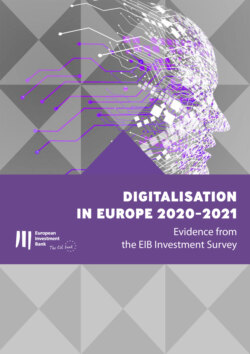Читать книгу Digitalisation in Europe 2020-2021 - Группа авторов - Страница 5
На сайте Литреса книга снята с продажи.
Overview
ОглавлениеTo achieve sustainable growth, Europe must embrace the potential of digital technologies. The digital revolution has already transformed industries, production processes and ways of living and working, but many of these shifts are only just starting. Most European firms surveyed by the EIB Investment Survey (EIBIS) believe that COVID-19 will accelerate the use of digital technologies even further.
As with previous technology waves, taking an early lead can be critical for lasting competitiveness. Yet with the global innovation and technology landscape changing rapidly and with the winner-takes-all tendencies of digital technologies, Europe risks becoming entrenched in its position as a follower on digitalisation.
The adoption of digital technologies by firms in the European Union is improving, but it has not yet closed the gap with the United States. By 2020, 37% of firms in the European Union had still not adopted any advanced digital technologies, compared with 27% in the United States. There is also a risk of digital polarisation among European firms. Small businesses in particular are creating this lag between the European Union and the United States.
While some EU countries are at the global forefront of digital transformation, others risk being left behind. The downside risks to jobs and growth from both automation and the climate transition are not evenly spread. Some of the least developed regions in the European Union are most at risk.
Digitalisation is mainly an opportunity, not a threat, now more than ever. Our data show that digital firms are more productive, employ more skilled workers and foresee more employment growth opportunities ahead. By taking action to help firms invest in the new technologies they need, we can spur growth and help close the divides that exist within Europe, strengthening our cohesion.
Addressing barriers to digitalisation is crucial. Exploiting the full potential of digital transformation requires skills and managerial capabilities. Our analysis shows a strong correlation between managerial practices and digitalisation and evidence of digital skills gaps throughout Europe. The level of access to digital infrastructure is converging across Europe, but more needs to be done to accelerate the spread of fast connections. Although access to finance is not the major impediment to digitalisation, it can be a barrier for small firms.
To accelerate the pace of digital innovation and adoption, Europe must focus above all on three elements: an enabling ecosystem, the right kind of financial support for investment, and a European vision to counter the imbalances across the European Union. The EIB Group is playing an important role in all three aspects. As we recover from the pandemic, Europe will need to push forward with the green and digital transformation to lead the way.
| Debora RevoltellaDirector, Economics DepartmentEuropean Investment Bank |
